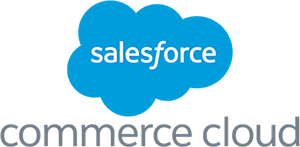Shopify vs Salesforce Commerce Cloud: In-Depth Comparison
Compare Technologies

(Reviews: 30K)
Est. users: 2M
Price Ranges: $29 - $79 - $299


(Reviews: 500)
Est. users: 150K
Price Ranges: $1000 - $2000
Shopify vs Salesforce Commerce Cloud
Shopify is a user-friendly, cloud-based e-commerce platform tailored for small to medium-sized businesses, offering ease of setup and extensive customization through apps and themes. Salesforce Commerce Cloud, on the other hand, is designed for larger enterprises, providing advanced features like AI-driven personalization and deep CRM integration, but often requires more technical expertise to fully leverage its capabilities.
Shopify
- User-friendly and easy to set up
- Great for small to medium businesses
- Comprehensive app store for extensions
- Affordable pricing options
- Hosted and managed solution
- Supports various payment gateways
- Scalable with various plans
Key Differences
-
Ease of Use
Shopify is known for its user-friendly interface and simple setup process, making it ideal for small to medium-sized businesses with limited technical expertise. Salesforce Commerce Cloud, on the other hand, offers a more complex but customizable experience, suited for larger enterprises.
Winner: Shopify
-
Customization
Salesforce Commerce Cloud offers extensive customization options and is highly flexible, allowing for complex integrations and tailored customer experiences. Shopify provides customization but remains relatively simpler with its theme-based approach.
Winner: Salesforce Commerce Cloud
-
Scalability
Salesforce Commerce Cloud is designed to scale seamlessly to meet the needs of large enterprises with vast product catalogs and high traffic. Shopify can also scale but might encounter limitations when dealing with extremely large-scale operations.
Winner: Salesforce Commerce Cloud
-
Cost
Shopify offers various pricing plans suited to small and medium businesses, making it more accessible budget-wise. Salesforce Commerce Cloud generally requires a higher investment, which might be more suitable for organizations with larger budgets.
Winner: Shopify
-
Built-In Features
Salesforce Commerce Cloud boasts a comprehensive suite of built-in features and capabilities, including advanced personalization and AI-driven insights. Shopify provides numerous built-in features but often relies on third-party apps for additional functionalities.
Winner: Salesforce Commerce Cloud
-
Time to Market
Shopify enables merchants to set up their online store quickly due to its simplicity and pre-built templates, leading to a faster time to market. Salesforce Commerce Cloud, while powerful, can require more time for implementation and customization.
Winner: Shopify
-
Integration with Other Systems
Salesforce Commerce Cloud seamlessly integrates with other Salesforce products, providing a unified ecosystem for businesses already using Salesforce. Shopify offers good integration capabilities but might require additional apps or custom development for seamless ERP/CRM connections.
Winner: Salesforce Commerce Cloud
Distinct Features
| Shopify | Salesforce Commerce Cloud |
|---|---|
| Easy-to-use drag-and-drop store builder | Advanced AI-driven personalization and product recommendations |
| Built-in blogging platform | Einstein AI for predictive insights and analytics |
| Shopify App Store with extensive third-party integrations | In-depth platform for B2B commerce with extensive customization |
| Shopify POS for seamless in-person sales | Full integration with Salesforce CRM for unified customer data |
| Abandoned cart recovery without additional customization | Omni-channel order management |
| 24/7 customer support for all plans | Robust tools for multi-site management |
| Multiple staff accounts depending on plan | Enhanced customer segmentation and targeting |
| Lower entry cost and simpler pricing models | Dynamic content personalization |
| Built-in SEO tools | Seamless integration with Salesforce Marketing Cloud |
| Support for print-on-demand services | APEX programming language for custom solutions |
| Direct integrations with social media sales channels | Built-in customer service tools |
Pricing Overview
Indepth Overview
| Shopify | Salesforce Commerce Cloud | |
|---|---|---|
| eCommerce | ||
| Cross Channel Integration | ★4.5 - Ability to integrate with multiple sales channels | ★4.7 - Seamless integration across multiple channels |
| Payment Gateway Integration | ★4.7 - Wide range of payment gateway options | ★4.6 - Integration with popular payment gateways |
| Product Management | ★4.6 - Easy management of product inventory | ★4.7 - Comprehensive tools for managing product catalog |
| Theme Customization | ★4.3 - Extensive options for customizing store themes | ★4.5 - Flexible options for customizing store themes |
| App Market | ★4.8 - Large selection of apps and integrations | ★4.3 - Extensive library of commerce-specific apps |
| Abandoned Cart Recovery | ★4.7 - Ability to follow up on abandoned carts | ★4.8 - Automated recovery campaigns for abandoned carts |
| Dropshipping Integration | ★4.1 - Built-in support for dropshipping | ★4.6 - Built-in support for dropshipping processes |
| Built-in Blogging Platform | ★4.2 - Integrated blogging functionality | ★3.9 - Limited blogging functionality |
| SEO Optimization | ★4.6 - Tools to optimize store for search engines | ★4.7 - Advanced SEO tools for optimizing store |
| Mobile Commerce | ★4.4 - Responsive design for mobile devices | ★4.5 - Mobile-ready storefront experiences |
| Marketing | ||
| Email Marketing | ★4.5 - Tools for managing email marketing campaigns | ★4.7 - Robust email marketing capabilities |
| Social Media Integration | ★4.6 - Integration with popular social media platforms | ★4.7 - Deep integration with social media platforms |
| SEO Tools | ★4.5 - Optimization features to improve search engine rankings | ★4.6 - Comprehensive SEO optimization features |
| Discounts and Promotions | ★4.7 - Ability to create and manage discounts | ★4.6 - Advanced promotion creation and management |
| Customer Segmentation | ★4.3 - Segment customers based on behavior and demographics | ★4.5 - Powerful segmentation options for targeted marketing |
| Inventory Management | ||
| Inventory Tracking | ★4.7 - Real-time inventory tracking and management | ★4.6 - Accurate inventory tracking across channels |
| Stock Alerts | ★4.3 - Notifications for low stock levels | ★4.4 - Notifications for low stock levels |
| Supplier Management | ★4.1 - Ability to manage supplier information | ★4.3 - Supplier information management |
| Barcode Scanning | ★4.5 - Built-in barcode scanning capabilities | ★4.1 - Support for barcode scanning |
| Warehouse Management | ★4.2 - Tools for managing multiple warehouses | ★4.5 - Warehouse management capabilities |
| Analytics and Reporting | ||
| Sales Reports | ★4.6 - Generate detailed reports on sales performance | ★4.7 - Comprehensive sales reporting |
| Customer Reports | ★4.5 - Analyze customer behavior and trends | ★4.6 - Detailed analysis of customer data |
| Traffic Reports | ★4.4 - Monitor website traffic and sources | ★4.5 - Track website traffic and referral sources |
| Conversion Tracking | ★4.7 - Track conversion rates and optimize | ★4.8 - Measure and optimize conversion rates |
| Abandoned Cart Analysis | ★4.2 - Analyze reasons for abandoned carts | ★4.5 - Identify reasons for abandoned carts |
| Customer Support | ||
| Live Chat Support | ★4.5 - Real-time chat support for customers | ★4.6 - Real-time chat support and messaging |
| Phone Support | ★4.2 - Phone support available during business hours | ★4.4 - Dedicated phone support |
| Knowledge Base | ★4.6 - Extensive documentation for self-help | ★4.7 - Comprehensive online documentation |
| Community Forum | ★4.4 - Active community forum for peer support | ★4.5 - Engaged community forum for support |
| 24/7 Support | ★4.3 - Round-the-clock support available | ★4.6 - 24/7 customer support availability |








![How To Start An Online Store With No Money & Without Inventory In The USA & Worldwide Legally? Free Ways In 2024 [No Skill Required] how to start an online store with no money](https://websitebuilderly.com/wp-content/uploads/how-to-start-an-online-store-with-no-money-300x200.jpg)
Comments